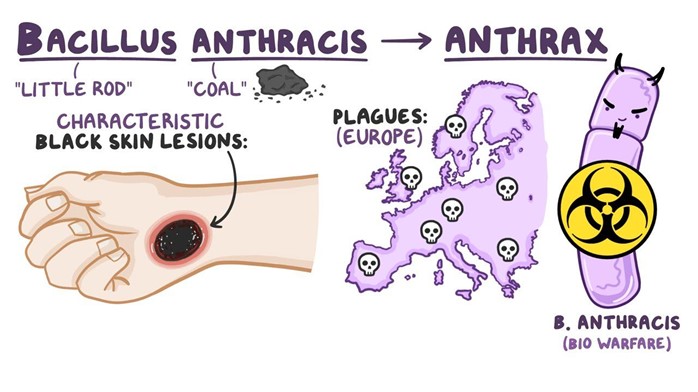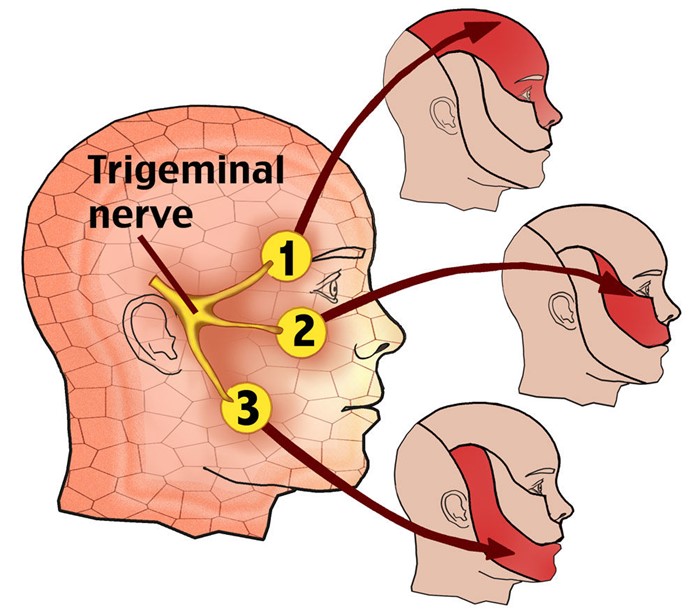The facility education nurse is providing a group of new nurses education regarding weaponized biological threats. When discussing anthrax, which of the following should be included as portals of entry? SELECT ALL THAT APPLY
Integumentary system
Endocrine system
Central nervous system
Renal system
Respiratory system
Correct Answer : A,C,E
Choice A reason: The integumentary system is a portal of entry for anthrax because the bacteria can enter through cuts or abrasions on the skin. This is called cutaneous anthrax, and it is the most common and least deadly form of anthrax infection.
Choice B reason: The endocrine system is not a portal of entry for anthrax because the bacteria do not affect the glands or hormones of the body. The endocrine system is mainly involved in regulating metabolism, growth, development, and reproduction.
Choice C reason: The central nervous system is a portal of entry for anthrax because the bacteria can spread to the brain and spinal cord from other parts of the body. This is called meningeal anthrax, and it is a rare and fatal complication of anthrax infection.
Choice D reason: The renal system is not a portal of entry for anthrax because the bacteria do not infect the kidneys or urinary tract. The renal system is mainly involved in filtering waste products and excess fluids from the blood.
Choice E reason: The respiratory system is a portal of entry for anthrax because the bacteria can be inhaled into the lungs. This is called inhalation anthrax, and it is the most deadly form of anthrax infection.

Nursing Test Bank
Naxlex Comprehensive Predictor Exams
Related Questions
Correct Answer is D
Explanation
Choice A reason: Analgesics are medications that relieve pain by blocking pain signals or reducing inflammation. They include nonsteroidal anti-inflammatory drugs (NSAIDs), opioids, and acetaminophen. However, analgesics are not very effective in treating trigeminal neuralgia, as they do not address the underlying cause of the pain, which is the compression or irritation of the trigeminal nerve.
Choice B reason: Antihistamines are medications that block the effects of histamine, a chemical that causes allergic reactions such as itching, sneezing, and swelling. They include diphenhydramine, cetirizine, and loratadine. Antihistamines are not effective in treating trigeminal neuralgia, as they do not affect the trigeminal nerve or its function.
Choice C reason: Antibiotics are medications that kill or inhibit the growth of bacteria that cause infections. They include penicillin, amoxicillin, and ciprofloxacin. Antibiotics are not effective in treating trigeminal neuralgia, as they do not target the trigeminal nerve or its pathology.
Choice D reason: Anticonvulsants are medications that prevent or reduce the frequency and severity of seizures by stabilizing the electrical activity of the brain. They include carbamazepine, gabapentin, and phenytoin. Anticonvulsants are the most effective medications in treating trigeminal neuralgia, as they reduce the abnormal firing of the trigeminal nerve that causes the pain. Anticonvulsants are considered the first-line therapy for trigeminal neuralgia and can provide significant relief for most clients.

Correct Answer is D
Explanation
Choice A: Encourage community members to practice fire drills. This is incorrect because fire drills are a part of the preparedness phase, not the prevention/mitigation phase. The prevention/mitigation phase aims to reduce the risk and impact of disasters, while the preparedness phase aims to enhance the readiness and response capacity of individuals and communities.
Choice B: Identify community members who have disabilities. This is incorrect because identifying community members who have disabilities is also a part of the preparedness phase, not the prevention/mitigation phase. The prevention/mitigation phase focuses on actions that can prevent or minimize the occurrence or effects of disasters, such as installing smoke detectors, reinforcing buildings, or creating evacuation routes.
Choice C: Provide first aid to community members affected by a tornado. This is incorrect because providing first aid to community members affected by a tornado is a part of the response phase, not the prevention/mitigation phase. The response phase involves immediate actions to save lives, protect property, and meet basic needs after a disaster occurs.
Choice D: Assist community members in developing a disaster plan. This is correct because assisting community members in developing a disaster plan is a part of the prevention/mitigation phase. A disaster plan can help identify potential hazards, assess vulnerabilities, establish goals and objectives, and implement strategies to reduce the risk and impact of disasters.
Whether you are a student looking to ace your exams or a practicing nurse seeking to enhance your expertise , our nursing education contents will empower you with the confidence and competence to make a difference in the lives of patients and become a respected leader in the healthcare field.
Visit Naxlex, invest in your future and unlock endless possibilities with our unparalleled nursing education contents today
Report Wrong Answer on the Current Question
Do you disagree with the answer? If yes, what is your expected answer? Explain.
Kindly be descriptive with the issue you are facing.
